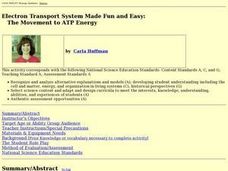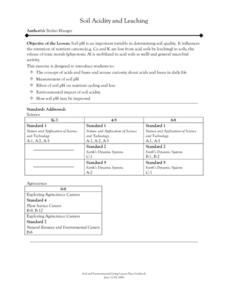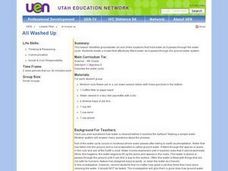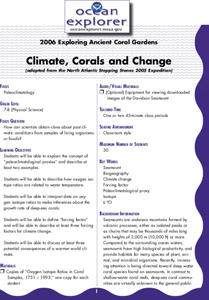Curated OER
Building A Bug Bungalow
Students chart how milkweed bugs grow and change. In this growth and life stages lesson plan, students read two stories and discuss how and why things grow. Students brainstorm what can be measured about humans, review and discuss life...
Curated OER
Let's Make a Compost Cake
Students create a compost cake. In this gardening and decomposition science lesson, students review and describe the "nutrient cycle." Students create a compost pile, measure and record the dimensions and temperature of the pile, and...
Curated OER
Waterdrops
In this science learning exercise, students learn the importance of water conservation by completing 6 pages in the color newsletter. Students list ways their school could save water, read cartoon tips for home water conservation and...
Curated OER
Electron Transport System Made Fun and Easy:
Students identity the components of electron transport system through role play. They explain the role of intermediate energy carriers to the production of ATP molecules. They describe the relationship of electron transport system to...
Curated OER
Soil Acidity and Leaching
Young scholars are introduced to the concept of acids and bases and arouse curiosity about acids and bases in daily life. They are introduced to the measurement of soil pH. Pupils are introduced to the effect of soil pH on nutrient...
Curated OER
The Dirt on Plants
Students draw and label the four parts of a plant. They describe changes that are part of the common life cycle. Students follow various one and two step directions. They are asked to discuss that they can recall about plants.
Curated OER
Chesapeake Bay
The Chesapeake Bay is the largest estuary in the United States. Explore its origins, organisms, and contributing rivers with this PowerPoint. It opens with several slides of general information on the formation of estuaries, then it...
Curated OER
Kids for Conservation Lesson 1
Third graders observe various demonstrations dealing with the water on our earth, such as a comparison of the amount of salt water and fresh water on earth, then participate in a role playing activity in which they become a molecule of...
Curated OER
Not a Drop to Drink
Students explore potential issues of a water shortage. In this water conservation lesson, students brainstorm the many uses of water and what life would be like if there was not enough water available.
Curated OER
Tree Bagging
Students bag trees to determine the mass of the water given off in the evapotranspiration process.
Curated OER
All Washed Up
Fourth graders simulate filtration of water containing contaminates to determine how nature cleans water. They make predictions, report observations, and construct reasonable explanations concerning their outcomes. then connect this to...
Curated OER
Water Table
Pupils study the meaning of a water table and how it contributes to the existence of streams, swamps, and lakes in Nebraska. They conduct an experiment and complete a diagram of the hydrologic cycle.
Curated OER
Evaporation and Condensation
Students explore how temperature affects the processes of evaporation and condensation.
Curated OER
Farming - Ireland
In this farming worksheet, students explain what is meant by sustainable development. Students review how rain develops. Students determine how climate effects crops that can be farmed. This worksheet has 4 graphic organizers, 1 graph,...
Curated OER
Weather Olympics
Students consider the effects of topography on climate patterns. In this earth science lesson, students research weather patterns and make inferences of how the land forms may create different climates. Students compare Celsius...
Chicago Botanic Garden
Greenhouse Gas Emissions – Natural and Human Causes
Part three in the series of seven has pupils discussing the different greenhouses gases, learning about the carbon cycle, and then watching a short video about the carbon cycle. Based on their knowledge, individuals complete a greenhouse...
Curated OER
The Marvels of Mud
Young scientists roll up their sleeves and get a little dirty in this three-day earth science investigation. Following the scientific method, children monitor the growth of algae in pond water samples in order to determine the role that...
Mr. E. Science
Erosion and Deposition
Get an in-depth look into erosion and deposition with a 23-slide presentation that details how gravity, water, waves, wind, and glaciers cause changes to the Earth's surface. Each slide consists of detailed images equipped with labels,...
NOAA
The Incredible Carbon Journey: Play the Carbon Journey Game
Class members explore the carbon cycle in the final installment of the 10-part Discover Your Changing World series. They play a simulation game where they walk through the steps carbon takes as it cycles through the different layers of...
Space Awareness
Ocean Acidification
Learn the science behind ocean acidification and its effects on ocean wildlife. Young scientists conduct a laboratory investigation that monitors the acidity level of water. While burning a candle, learners capture the carbon dioxide in...
Discovery Education
Motion in the Ocean
How do temperature changes affect ocean currents? Scholars explore convection currents by demonstrating the flow of water in a baking dish. They use ice, heat, and food coloring to see currents. Then, they draw conclusions about their...
NOAA
Climate, Corals and Change
Global warming isn't just an issue on land; deep ocean waters are also showing troubling signs. Young scientists learn more about deep water corals and the many recent discoveries researchers have made. Then they examine data related to...
National Wildlife Federation
Penguin Fun Facts
What's black and white and can dive up to 1,800 feet under water? That's right, penguins! Learn this and many other amazing facts about these unique birds with this handy reference sheet.
Curated OER
"Hey Polliwog!" - The Life Cycle of the Frog
In this life cycle of the frog activity, learners read and assess comprehension. In this fill in the blank and sequencing activity, students write answers to sixteen questions.
Other popular searches
- Water Cycle Diagram
- The Water Cycle
- Water Cycle Experiment
- Water Cycle Activities
- Water Cycle Stages
- Water Cycle Crossword
- Water Cycle Lesson Plans
- Water Cycle Reader's Theater
- Water Cycle and Evaporation
- Water Cycle Diagram Label
- Water Cycle Simulation
- Build Your Own Water Cycle

























